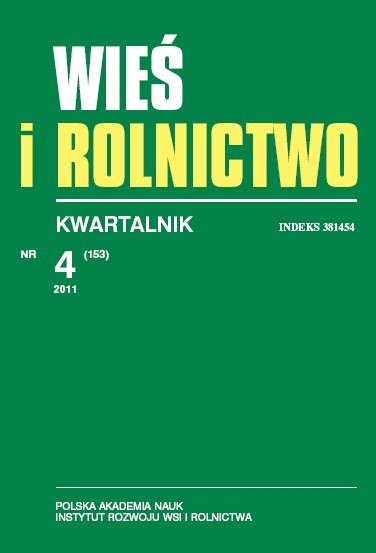The institution of village assembly in the opinion of village administrators and inhabitants (on the example of the X municipality)
DOI:
https://doi.org/10.53098/wir.2011.4.153/13Keywords:
village assembly, local self-government, civic participation, local democracyAbstract
Unlike the institution of referendum which is often analyzed by Polish researchers, the institution of village assembly is far less frequently the object of their deliberations – both in the context of examination of legal regulations and in the context of assessment of social practice. This fact is surprising since village assembly as a legislative body of the auxiliary unit of rural or rural/urban municipality, namely the village, is a well-established form of civic participation in rural communities and represents a unique variant of parliamentary activity at the very local level. The author of the article wants to make up at least in some degree for this lack of sufficiently thorough considerations. He presents a brief description of the institution of village assembly and, next, provides data relating to the way in which village administrators and inhabitants of one the municipalities of the Łódzkie voivodeship perceive the institution of village assembly. Due to the strictly “illustrative” character of research, it was difficult to formulate general conclusions; the author concentrated his attention and efforts on cataloging issues that had been most frequently raised by the surveyed groups. The majority of respondents considered village assembly to be a blocked-up “channel” of civic participation and felt that its “mechanics” was arduous. In this context it was surprising for the author of the article that both village administrators and inhabitants were reluctant to accept his suggestion that it would be good to introduce a moderator/facilitator into village assemblies, who would see to it that all inhabitants participating in such meetings have equal chances to speak and express their opinions, and who would help them come to an understanding.
References
Abramowicz B., 2010: Aktywność obywatelska mieszkańców sołectw (na przykładzie województwa łódzkiego). W: Stan i perspektywy demokracji bezpośredniej w Polsce. Red. M. Marczewska-Rytko. Wydawnictwo UMCS, Lublin.
Abramowicz B., 2011: Zebranie wiejskie jako przykład zgromadzeniowej formy uczestnictwa obywatelskiego – sprawozdanie z obserwacji. „Samorząd Terytorialny” 6: 17–31.
Błażejczyk M., 1986: Samorząd mieszkańców wsi. Wydawnictwo Spółdzielcze, Warszawa.
Bohdan A., 2005: Demokracja bezpośrednia we współczesnym modelu samorządu terytorialnego na przykładzie gminy. W: Demokracja – społeczeństwo – globalizacja. W kręgu problemów współczesnej demokracji. Red. A. Jabłoński, Z.M. Nowak. Instytut Śląski, Opole.
Krzynówek A., 2010: Rozum a porządek polityczny. Wokół sporu o demokrację deliberatywną. Wyższa Szkoła Filozoficzno-Pedagogiczna „Ignatianum” i Wydawnictwo WAM, Kraków.
Lutyńska K., 2005: Wywiad socjologiczny. W: Encyklopedia socjologii, Suplement. Red. H. Kubiak i in. Oficyna Naukowa, Warszawa.
Przybyłowska I., 1978: Wywiad swobodny ze standaryzowaną listą poszukiwanych informacji i możliwości jego zastosowania w badaniach socjologicznych. „Przegląd Socjologiczny” XXX.
Ustawa z dnia 8 marca 1990 r. o samorządzie gminnym. Dz.U. 1990 r., nr 16, poz. 95; tekst jedn. Dz.U. 2001 r., nr 142, poz. 1591 z późń. zm.
Downloads
Article file downloads
Pages
How to Cite
Issue
Section
License
Copyright (c) 2011 Wieś i Rolnictwo

This work is licensed under a Creative Commons Attribution 4.0 International License.








